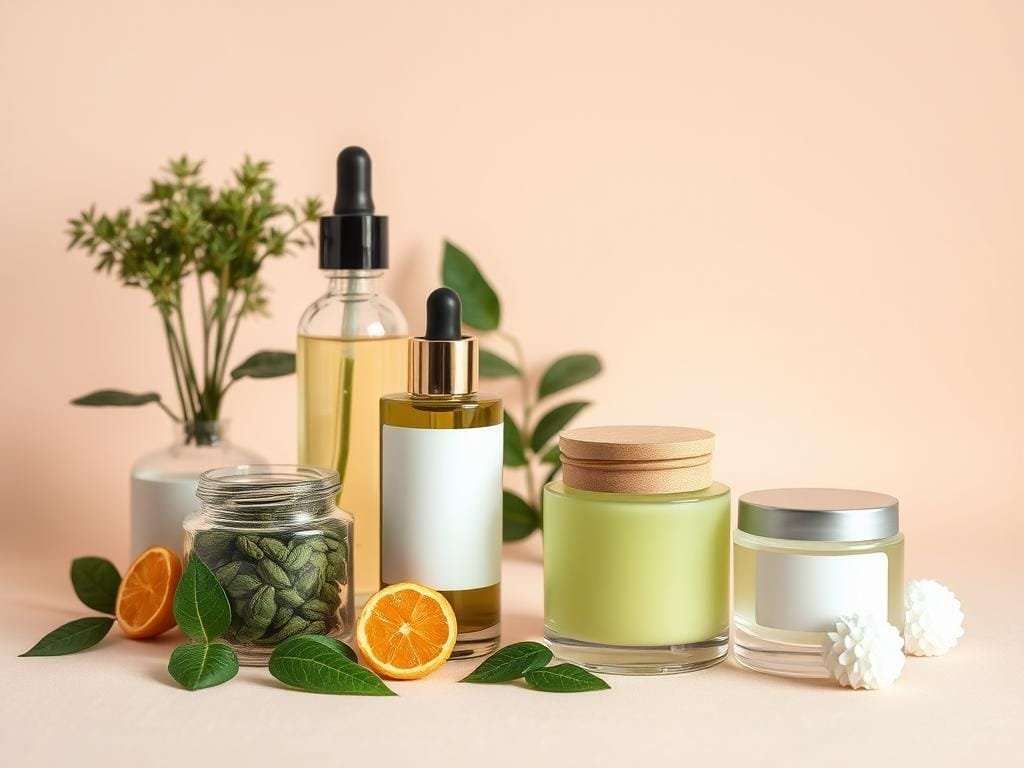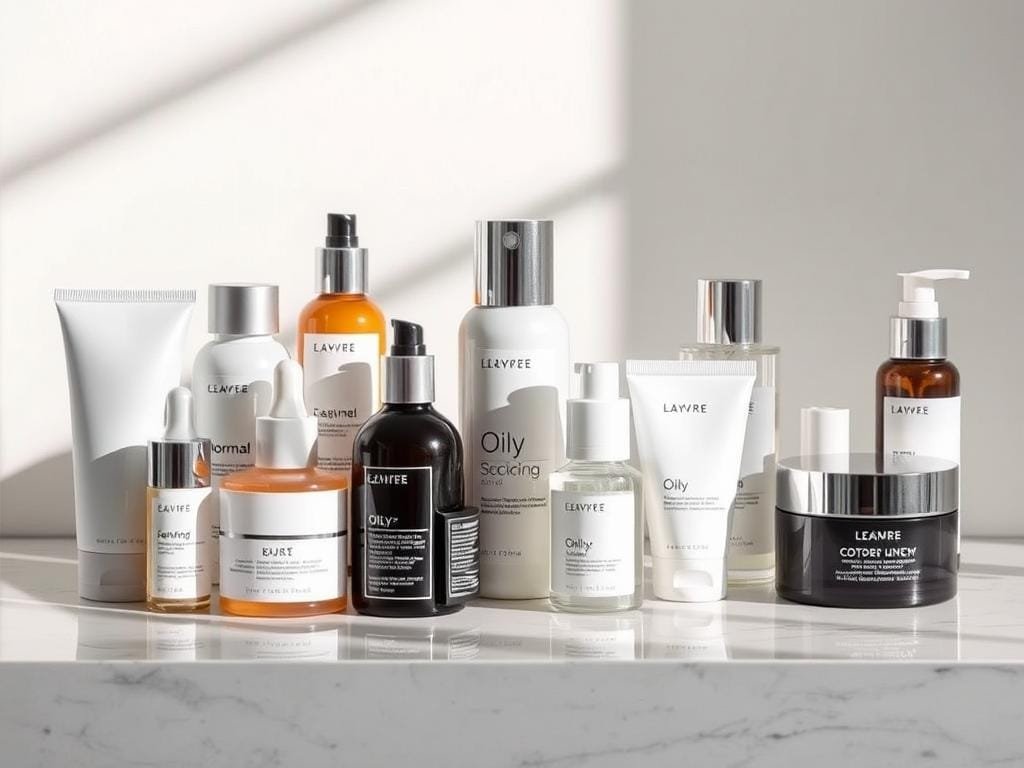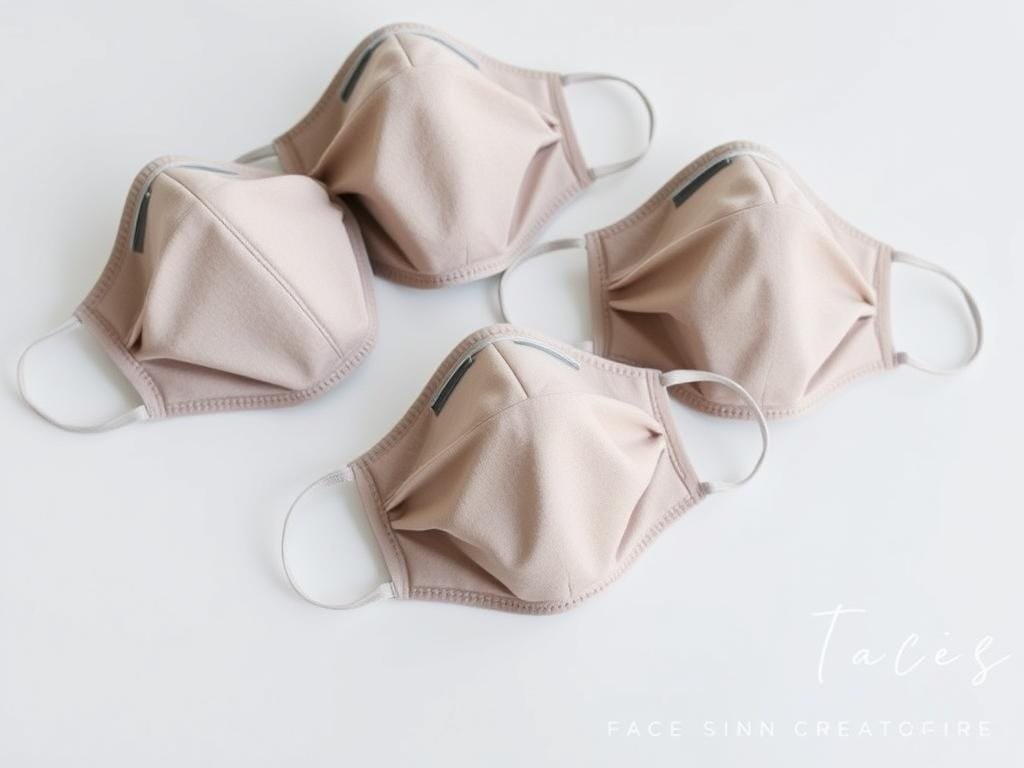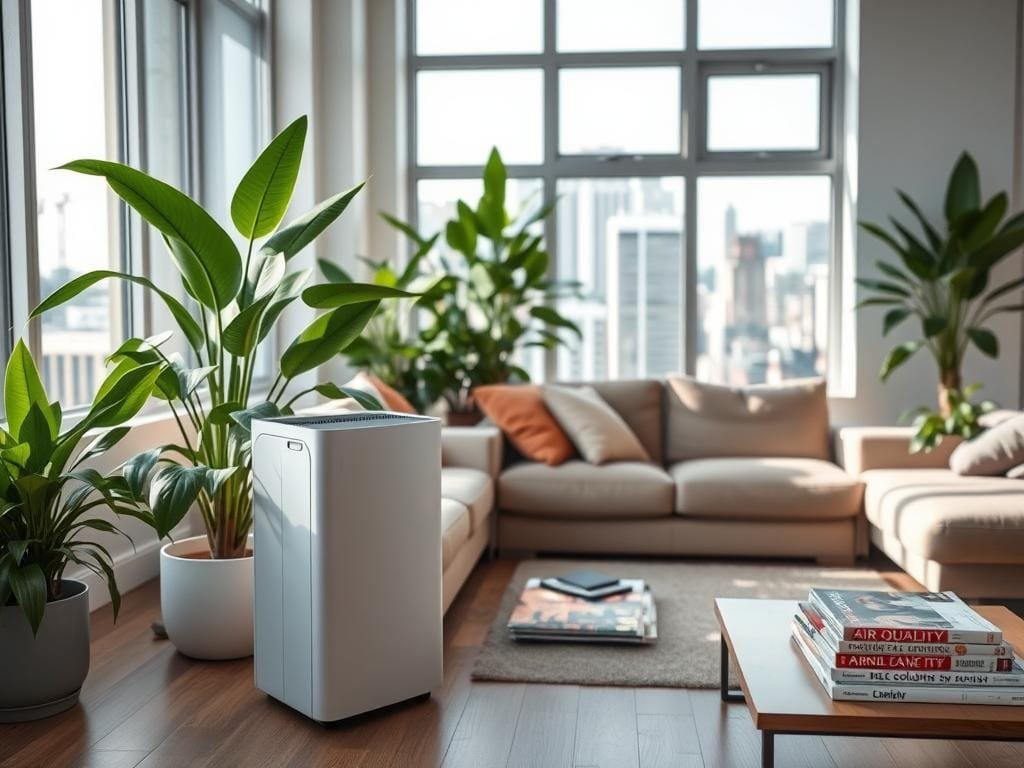Did you know air pollution can harm your skin? It can cause early aging, dark spots, and other issues. As cities get more polluted, keeping your skin safe is more important than ever.
Anti-pollution skincare is now a key part of a good skincare routine, mainly in cities. The right products can protect your skin from harmful pollutants.
Natural ingredients like antioxidants are key. They help fight off free radicals, which are common in polluted areas.
Table of Contents
Key Takeaways
- Air pollution can lead to premature aging and skin issues.
- Anti-pollution skincare is vital in urban areas.
- Natural ingredients like antioxidants can protect your skin.
- Using the right skin care products can shield your skin from pollutants.
- A complete skincare routine is essential for healthy skin.
Understanding Pollution’s Impact on Skin Health
Urban pollution is a big problem for our skin. It can cause early aging and skin issues. Our skin is the biggest organ and protects us from harmful pollutants.
Types of Pollution Affecting Your Skin
Several types of pollution can harm your skin, including:
- Particulate Matter (PM): Tiny particles that can deeply harm your skin, causing stress and inflammation.
- Polycyclic Aromatic Hydrocarbons (PAHs): Chemicals from burning fossil fuels and organic materials, damaging skin.
- Nitrogen Dioxide (NO2) and Ozone (O3): Gases that damage skin cells by creating harmful oxygen species.
Common Skin Issues from Urban Living
High air pollutant levels can cause skin problems, such as:
- Premature Aging: Pollutants can lead to fine lines, wrinkles, and age spots.
- Photodamage: Pollutants increase UV damage, causing skin color and texture changes.
- Skin Conditions: Pollutants can worsen or trigger conditions like atopic dermatitis and psoriasis.
To fight these issues, a strong skincare routine is key. Using natural skincare or organic skincare products helps avoid harmful chemicals.
Key Ingredients in Anti-Pollution Skincare
Finding the right skincare ingredients is key to healthier skin. Pollution can cause early aging and dullness. But, some ingredients can fight these effects.
Antioxidants: The Skin’s Best Defense
Antioxidants are vital in fighting pollution’s harm to the skin. Vitamin C and vitamin E are known for fighting free radicals. This reduces stress and inflammation. Adding antioxidant-rich products to your routine boosts your skin’s defense.
“Antioxidants are key in fighting environmental stressors. They keep the skin healthy and looking good by fighting pollutant damage.”
Top antioxidant ingredients include:
- Vitamin C
- Vitamin E
- Green tea extract
- Resveratrol
Charcoal and Clay: Natural Cleaners
Charcoal and clay are natural detoxifiers. They pull out impurities and pollutants, leaving skin clean. Charcoal absorbs oil well, while clay masks deeply cleanse and nourish.

| Ingredient | Benefits | Skin Type |
|---|---|---|
| Charcoal | Deep cleansing, oil absorption | Oily, combination |
| Clay | Nourishing, detoxifying | Normal, dry |
For more on anti-pollution skincare, check out this resource. It offers insights into the best products and ingredients for fighting pollution.
Daily Skincare Routine for Urban Dwellers
The urban lifestyle needs a robust skincare routine to fight pollution and environmental stress. A regular routine keeps your skin healthy and strong.
Essential Steps for Morning Care
Starting your day with the right skincare is key. Begin with a gentle cleansing to wash away overnight dirt. Then, use an antioxidant serum to fight off free radicals and pollution.
Next, apply a moisturizer that matches your skin type. It keeps your skin hydrated and protects it from pollutants. For tips on a sustainable skincare routine, check out this resource.
Evening Rituals to Combat Pollution
In the evening, focus on deep cleansing and nourishment. Start with a double cleansing method to remove makeup, dirt, and pollutants from the day. This is followed by a toner to balance your skin’s pH.
Then, apply a nourishing serum or treatment product to repair and protect your skin. Finish with a night cream or moisturizer to hydrate and rejuvenate your skin while you sleep. For more on urban skincare challenges and solutions, see this guide.
Following these morning and evening skincare steps can greatly improve your skin’s defense against urban pollution. Think about using organic skincare products to avoid harsh chemicals and enjoy natural benefits.
Choosing the Right Products for Your Skin Type
Finding the right skincare products is all about knowing your skin type. There are many products out there, each tackling different skin issues. It’s important to make a smart choice.

Oily, Dry, and Combination Skin Considerations
If you have oily skin, look for products that say “oil-free” or “non-comedogenic.” These won’t clog your pores. Salicylic acid and tea tree oil can also help control oil and fight acne.
Dry skin needs moisturizers with hyaluronic acid and ceramides. These keep moisture in and fix the skin’s barrier. Stay away from harsh ingredients that take away your skin’s natural oils.
For combination skin, you might need different products on different parts of your face. Use a light moisturizer on oily spots and a richer one on dry areas. This helps balance your skin.
“The right skincare products can make a significant difference in the health and appearance of your skin. Understanding your skin type is key to making the best choices.”
Recommendations for Sensitive Skin
If your skin is sensitive, choose products without fragrances and are hypoallergenic. Aloe vera and green tea are good because they soothe and don’t irritate.
- Always patch test new skincare products to check for any adverse reactions.
- Read product labels carefully, avoiding ingredients known to irritate your skin.
- Consider consulting with a dermatologist for personalized recommendations.
By picking the right skincare products for your skin type, you can improve your skin’s health and look. Enjoy the skincare benefits of a well-chosen routine.
The Role of Sunscreen in Anti-Pollution
Sunscreen is key in fighting pollution in skincare. It blocks UV rays that make pollution worse for your skin. Your skin faces pollution and UV damage together, making things harder.
Why SPF is Essential for Urban Environments
Urban areas are tough on skin because of pollution and UV rays. SPF (Sun Protection Factor) measures how well sunscreen blocks UVB rays, which cause sunburn and skin damage. Using sunscreen with high SPF is vital to protect your skin from UV damage in polluted cities.
“Sunscreens with high SPF protect better against UVB rays, lowering sunburn and skin damage risks,” experts say. When picking sunscreen for pollution, choose broad-spectrum ones with SPF 30 or higher.
Selecting Broad-Spectrum Protection
Broad-spectrum protection is key because it blocks UVA and UVB rays. UVA rays go deep into the skin, causing aging and making pollution worse, while UVB rays cause sunburn. A broad-spectrum sunscreen protects against both UV types.
- Look for sunscreens labeled as “broad-spectrum.”
- Choose products with SPF 30 or higher for optimal protection.
- Consider water-resistant sunscreens if you plan to be outdoors for extended periods.
Adding a broad-spectrum sunscreen to your daily skincare routine boosts your skin’s defense against urban pollution.
Incorporating Face Masks for Extra Care
To fight urban pollution’s effects on your skin, add face masks to your routine. Face masks give your skin an intense care boost. They tackle specific issues like detoxification and hydration.

There are many face masks out there, each with its own benefits. You can choose from detoxifying masks or hydrating masks. Detoxifying masks pull out impurities and pollutants, using charcoal and clay. Hydrating masks add moisture and soothe dryness, with hyaluronic acid and glycerin.
Detoxifying Masks vs. Hydrating Options
Decide between detoxifying and hydrating masks based on your skin type and needs. If pollution is high, use a detoxifying mask 1-2 times a week. For dry or tight skin, a hydrating mask is best.
“The right face mask can change your skin in minutes,” says Dr. Jane Smith. “Know your skin’s needs and pick a mask that meets them.”
Frequency of Use for Best Results
How often to use face masks depends on your skin and the mask type. Most people use them 1-2 times a week. But, if you have oily skin or live in polluted areas, use detoxifying masks more.
- For normal to dry skin: 1-2 times a week, focusing on hydration.
- For oily skin: 2-3 times a week, using detoxifying masks.
- For combination skin: alternate between hydrating and detoxifying masks based on your skin’s needs.
Adding face masks to your skincare routine steps helps your skin fight urban pollution better. You’ll get healthier, more resilient skin.
Importance of Hydration in Urban Skincare
Hydration is key for healthy skin, more so in cities. Pollution can dry out your skin, causing irritation and dullness. So, keeping your skin hydrated is essential to fight these issues and keep your skin strong.
Drinking Water and Skin Health
Drinking water is vital for your skin. It removes toxins, making your skin clearer and less prone to acne. Proper hydration also makes your skin more elastic, reducing wrinkles. For more on hydration and skin health, check out this resource.
Here are some key benefits of drinking water for your skin:
- Flushes out toxins, reducing acne and skin issues
- Improves skin elasticity, reducing fine lines and wrinkles
- Maintains skin hydration, preventing dryness and irritation
Hydrating Products to Consider
Using hydrating skincare products also boosts your skin’s moisture. Look for products with hyaluronic acid, glycerin, and ceramides. These ingredients lock in moisture and strengthen your skin’s barrier.
Some effective hydrating products include:
- Serums with hyaluronic acid for intense hydration
- Moisturizers containing glycerin for long-lasting moisture
- Creams with ceramides to repair and strengthen the skin’s barrier
Lifestyle Changes to Minimize Pollution Effects
Making a few lifestyle changes can greatly help your skin in polluted cities. By adjusting your daily routine, you can shield your skin from city pollution.
Avoiding Peak Traffic Areas
One easy way to cut down pollution is to stay away from busy traffic times. Try to plan your outdoor activities when it’s less crowded. This way, you avoid vehicle emissions, a big pollution source.
Dr. Jane Smith, a dermatologist, says, “Staying away from heavy traffic reduces skin pollution.”
“The less you’re exposed to heavy traffic, the healthier your skin will be,” she adds.
Indoor Air Quality Improvement Tips
Improving your home’s air quality is key to fighting pollution’s skin effects. Using air purifiers can remove pollutants, making your home air cleaner for your skin.
- Regularly clean and dust your home to reduce particulate matter.
- Use plants known to purify the air, such as spider plants or peace lilies.
- Ensure your home is well-ventilated to prevent the buildup of indoor pollutants.

By making these lifestyle changes, you can boost your skin’s fight against city pollution. It’s not just about what you put on your skin. It’s also about the air you breathe.
FAQs About Anti-Pollution Skincare
Urban pollution can harm your skin, but the right skincare can help. You might wonder about the best ways to protect your skin and the long-term effects of pollution.
Adjusting Your Skincare Routine
How often to change your skincare routine is a common question. It depends on your skin type, pollution levels, and products used. Most people should review their routine every 6 to 12 months.
If your skin or environment changes, you might need to adjust more often. For example, during high pollution times, you might switch to more protective products. Staying updated on anti-pollution skincare research is key. Learn more in our guide on anti-pollution skincare.
The Risk of Long-Term Skin Damage
Prolonged exposure to pollutants can cause long-term skin damage. This includes wrinkles, discoloration, and loss of skin elasticity. Pollution can also worsen conditions like acne and rosacea.
Here’s a table showing common pollution-related skin issues and their long-term effects:
| Skin Issue | Short-Term Effects | Long-Term Implications |
|---|---|---|
| Premature Aging | Fine lines, dull skin | Deep wrinkles, loss of skin elasticity |
| Hyperpigmentation | Dark spots, uneven tone | Persistent discoloration |
| Acne | Clogged pores, inflammation | Scarring, persistent breakouts |
Understanding these risks helps you protect your skin. Use antioxidant-rich products, maintain a consistent routine, and reduce pollution exposure.
In conclusion, being informed and proactive is key to fighting pollution’s effects on your skin. Stay updated with skincare research and adjust your routine as needed. This way, you can keep your skin healthy and resilient, even in urban areas.
Trendy Anti-Pollution Skincare Brands
The skincare world is seeing a big rise in anti-pollution products. Many brands are leading the way. Now, you can find lots of effective ways to shield your skin from city pollution.
Favorite Brands Making a Difference
Brands like The Inkey List are leading the pack. They offer innovative skincare that fights pollution. Their Hyaluronic Acid Serum and Vitamin C Serum are top picks for keeping skin hydrated and fighting off free radicals.
Innovative New Entries to Watch Out For
New brands are popping up with special formulas. When picking anti-pollution skincare, go for trendy brands with key ingredients. Look for products that use natural stuff and the latest in skincare tech.
Choosing the right anti-pollution skincare brands can boost your routine and keep your skin safe from city grime. Check out these trendy brands and their products to find the perfect match for your skin.
